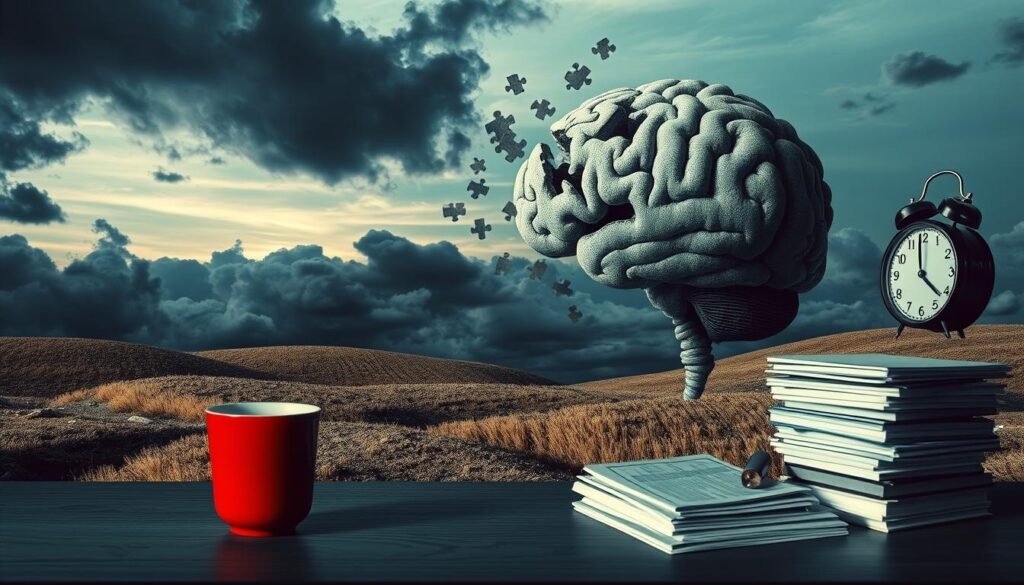Ever thought a bad night’s sleep could lead to poor choices? The link between sleep loss and decision-making is deep. Studies show that not sleeping well greatly influences our thinking and feelings. This, in turn, affects our decisions.
Not getting enough sleep messes with how we think and assess risks. Lack of sleep can lower brain activity linked to understanding wins and losses. This means, without enough sleep, it’s hard to judge risks accurately. People who don’t sleep for a whole night react less to good or bad outcomes. Their emotional control gets disturbed, changing how they make decisions when pressured.
The impact of no sleep goes beyond making poor choices. It also shows the subtle differences between missing a lot vs. a little sleep. Both harm decision-making, but how they do so can vary. This makes it clear how key good sleep is. It’s essential for both our physical wellness and our ability to make smart choices.
Key Takeaways
- Total sleep deprivation significantly decreases brain activation related to decision-making outcomes.
- Sleep disruption can alter risk perception, impacting judgment ability and decision quality.
- Emotional responses fluctuate under sleep deprivation, reducing the ability to evaluate wins and losses.
- Partial sleep deprivation increases impulsivity and risk-taking behaviors compared to total sleep deprivation.
- Optimal sleep duration is recommended to be 7-8 hours nightly for healthy cognitive performance.
Introduction to Sleep and Decision-Making
Getting enough sleep is key for good decision-making. The importance of sleep in decision-making shines when we note that lack of sleep hurts our ability to judge risks and make decisions. Research shows that our ability to think and make decisions changes with both our sleep patterns and the natural day-night cycle.
Not getting enough sleep or having a messed-up sleep schedule affects how alert and attentive we are. Studies have found that people not getting enough sleep struggle more with making decisions, especially about money. They tend to choose riskier options when they’re short on sleep.
In sleep deprivation studies, there were big changes in reaction time and attention, with poorer performance at night and better performance in the late morning and afternoon. How risky we are willing to be, as seen in experiments like the Balloon Analogue Risk Task (BART), shows how sleep impacts our thinking and decision-making during the day.
There’s a link between how we view risks and make decisions, and sleep loss can change how we approach gains and losses. This impacts the results of our choices. Understanding the role of sleep in thinking helps us find ways to be more productive and healthy.
Better sleep improves our health in the long run and boosts our ability to make good decisions. Tackling sleep issues can greatly improve our decision-making skills in life and work. For more info, check authoritative sources on the long-term health risks associated with chronic insomnia.
The Link Between Sleep Deprivation and Cognitive Function
Lack of sleep greatly impacts how well we think and perform tasks. It makes paying attention, remembering things, and making decisions hard. Studies show that not getting enough sleep slows down how fast we can make decisions. They also tell us that not sleeping at all is worse than sleeping a little, as it leads to more problems over time.
Not sleeping enough breaks important connections in the brain. This includes connections that help us judge situations well. People who don’t sleep enough take longer to decide on things. This is because they struggle to think about what’s right or wrong. The part of the brain that helps us think is trying to make up for these struggles. This shows how bad not sleeping enough is for our brain.

Sleep loss also messes with how we remember things. It disturbs the part of the brain called the hippocampus. This makes it hard for our brain to keep memories. So, we don’t do as well on tasks that need us to remember things. This problem can affect us now and in the future.
If you don’t sleep well for a long time, your brain might not work as well. This can make everyday tasks difficult. Losing sleep affects many parts of our lives. It shows why it’s so important to get enough sleep. Good sleep helps us think clearly and make smart choices.
| Impact Area | Effects of Sleep Deprivation |
|---|---|
| Attention | Increased attention lapses and reduced focus |
| Memory Consolidation | Hindered memory storage and recall |
| Decision-Making | Longer response times and impaired judgment |
| Neural Connectivity | Disruption between amygdala and prefrontal cortex |
| Emotional Regulation | Decreased adaptability and emotional capacity |
How Sleep Disruption Impairs Decision-Making
Sleep disruption’s effects on decision-making are profound and wide-reaching. It’s well-documented that sleep deprivation effects significantly harm our ability to make decisions. This is particularly important when considering risk and judgment, as lack of sleep changes how we weigh outcomes and adjust to new situations.
Impact on Judgment and Risk Assessment
Sleep loss leads to clear problems in judgment and assessing risks. For example, people who don’t get enough sleep respond less to feedback on success or failure. This weaker response messes with their risk perception and troubles their outcome evaluations. One study with 26 people, aged 22 to 40, showed those who went 62 hours without sleep had trouble adjusting their decision-making tactics. Their skills in learning from mistakes were notably worse than those who slept well.
Differentiating Between Total and Partial Sleep Deprivation
Understanding the difference between total sleep deprivation (TSD) and partial sleep deprivation (PSD) is key. TSD usually causes a broad decline in the quality of decisions made, hurting our cognitive abilities. On the other hand, PSD may lead to more impulsive actions and risk-taking. For instance, although sleep loss might not directly impact working memory, it can cause attentional lapses. These lapses hinder our ability to make solid decisions, especially under uncertainty.
| Type of Sleep Deprivation | Effects on Decision-Making |
|---|---|
| Total Sleep Deprivation (TSD) | Uniform decline in decision-making quality; difficulty adapting to new conditions. |
| Partial Sleep Deprivation (PSD) | Increased impulsivity; greater risk-taking behaviors. |
Sleep deficiency harms not just our decision-making but also how we react emotionally to those decisions. The link between sleep quality and cognitive ability highlights the importance of getting enough rest.

Effects of Sleep Disturbances on Emotional Responses
Sleep disturbances significantly change how we handle our emotions. Not getting enough sleep makes it hard to think clearly and control emotions. This is key for making good decisions. A study highlighted a spike in insomnia symptoms during the pandemic. One in three people showed clinical signs. This increase puts many at risk for psychological problems.
Altered Neural Activation Related to Decision Outcomes
When we don’t sleep well, our brain reacts differently to emotions. Positive feelings decrease, and negative ones get stronger. This is worse with long-term sleep loss. It makes our brain less effective in dealing with emotional situations. As a result, we face more emotional stress, hindering good judgment and decision-making.
Emotional Impact on Risk-Taking Behavior
Lack of sleep leads to more impulsive decisions. People tend to take more risks when they’re tired. Feelings of anxiety, confusion, and irritability make poor choices more likely. Over half of Americans have sleep issues during tough times. This shows how widespread sleep problems can affect our emotional well-being and decisions.

| Study Findings | Impact on Emotional Responses |
|---|---|
| Increased amygdala activity (60%) in anxiety-prone individuals | Amplified negative emotional reactivity |
| Negative affect stable on first day of sleep deprivation | Worsens significantly after two melatonin onsets |
| Inability to disengage from negative stimuli | Difficulty in emotional regulation strategies |
| Sleep disturbances linked to anxiety and depression | Higher rates of psychological distress |
In conclusion, sleep disturbances deeply affect our emotions and decisions. It’s vital to get enough sleep. This helps keep our emotions in check and our decision-making sharp.
Cognitive Function Impairment due to Sleep Loss
Not getting enough sleep greatly lowers how well our brains work. This is especially true for how we pay attention and remember things. Not sleeping enough for just one night, or over time, can harm us. Studies show that with less sleep, we make worse decisions because our mental functions don’t work as well.
It gets hard to focus, making us slow to react and judge situations poorly.
Deficits in Attention and Working Memory
Sleep loss makes it tough to concentrate and react quickly. Those who don’t sleep well can’t make decisions as easily. Without enough sleep, it’s hard to learn because memory consolidation needs sleep. This process helps us remember our experiences better.
Inhibition Control and Its Role in Decision Making
Not sleeping enough impacts our ability to control our responses and pay attention. Studies show that people who are sleep-deprived make hasty choices and bad risk assessments. This shows how vital sleep is for decision-making. Good sleep patterns help with learning, planning, and remembering.
| Effects of Sleep Deprivation | Cognitive Impairments | Impact on Decision-Making |
|---|---|---|
| Reduced Attention | Difficulty focusing on tasks | Slower reaction times |
| Impaired Working Memory | Challenges in retaining new information | Risk of making erroneous decisions |
| Weakened Inhibition Control | Increased impulsivity | Flawed risk assessments |
| Diminished Memory Consolidation | Struggles with factual and procedural memory | Difficulty in strategic planning |
Consequences of Sleep Deprivation in High-Stress Professions
Sleep deprivation seriously affects decision-making in high-stress jobs like those in the military, emergency response, and healthcare. These professionals often face tough situations where making good decisions is crucial. Studies show that not getting enough sleep can hurt a person’s judgment and the quality of their decisions.
Decision-Making Under Pressure
In high-pressure situations, making quick and accurate decisions is key. Sadly, many workers struggle with this because they’re not getting enough sleep. About 70 million people in the U.S. suffer from sleep disorders. Despite experts suggesting seven hours of sleep, around a third of Americans don’t meet this. Sleep deprivation can lead to bad risk-taking and more errors, raising the stakes in important decisions.
Case Studies of High-Stakes Environments
Many case studies show the impact of not sleeping enough in high-stress jobs. For example, sleepiness causes nearly 20% of serious car crash injuries. Also, 38% of U.S. workers admit to being tired at work, which leads to accidents and less productivity. This costs employers about $136.4 billion every year. Plus, sleep deprivation hurts mental health, with 35% of American adults unhappy with their sleep quality. This issue underscores the need for ways to manage sleep better, improving job performance and safety in high-demand careers.
The Role of Sleep Patterns in Decision Quality
Sleep patterns greatly impact decision-making by affecting our brain’s ability to work. When we don’t sleep well, our body’s natural rhythms get thrown off. This can mess up how we think. Studies show that not sleeping enough for a week or two makes us act like we’re severely sleep-deprived. This messes up our decision-making abilities.
Having a regular sleep schedule helps our memory work better. This is crucial for making smart decisions. If we don’t get enough sleep, it’s hard to remember things clearly. This makes it tough to learn from our past when we’re faced with choices. So, consistent sleep is key for our brains to work their best. Without enough sleep, we might not notice big mistakes and think bad choices look good.
Lack of sleep also hurts our creativity. It affects the part of our brain that helps us solve problems and come up with new ideas. A good sleep routine boosts creativity. But when we’re tired, we tend to make quick, not well-thought-out decisions. This can lead to taking unnecessary risks, especially for leaders making important decisions.
| Aspect | Impact of Sleep Patterns |
|---|---|
| Decision-Making Quality | Strengthened through adequate sleep, as cognitive performance improves. |
| Memory Consolidation | Directly affected by irregular sleep patterns; sleep deprivation inhibits memory function. |
| Creativity | Enhances when sleep patterns are consistent; impacted negatively by sleep loss. |
| Risk Assessment | Impromptu decisions increase with sleep deprivation, potentially leading to poor outcomes. |
Keeping a healthy sleep routine can make our brains work better, leading to smarter decisions. People who work on their sleep habits can really boost their ability to make good choices. To learn how sleep and brain function connect, more info is available here.
Sleep Quality and Its Direct Impact on Cognitive Performance
Studies show a strong link between how well we sleep and how we make decisions. It’s not just about how long you sleep, but the quality of that sleep matters too. Poor sleep can lead to bad decision-making and slow reaction times.
This happens because sleep helps clean our brains. Without enough sleep, our brains can’t function properly. This is why getting good sleep is key for our thinking and decision-making abilities.
Sleep Duration and Cognitive Efficiency
A study with 100 students found a clear link between how long they sleep and their thinking. Those who had a regular sleep schedule did better in school. Sleeping well before tests is very important for doing well.
It turns out that sleep accounts for about 25% of how students perform. This highlights how crucial good sleep is for our brains.
The Relationship Between Sleep Quality and Decision Outcomes
Good sleep matters not just in school, but in life too. When we sleep poorly, it’s harder to pay attention and make good choices. This can make solving problems very difficult.
Not getting enough REM sleep hurts our ability to remember and process emotions. Good sleep hygiene is essential for making smart choices and doing well in daily tasks. By sleeping well, we make better decisions and take smarter risks.